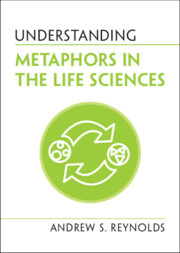Book contents
- Understanding Metaphors in the Life Sciences
- Series page
- Understanding Metaphors in the Life Sciences
- Copyright page
- Additional material
- Dedication
- Contents
- Foreword
- Preface
- Acknowledgements
- 1 Metaphors and Science
- 2 Background Metaphors
- 3 Genes and Genomes
- 4 Proteins
- 5 Cells
- 6 Evolution
- 7 Ecology
- 8 Biomedicine
- Concluding Remarks
- Summary of Common Misunderstandings
- References
- Index
3 - Genes and Genomes
Agents, Codes, Programs, Blueprints, and Books
Published online by Cambridge University Press: 11 April 2022
- Understanding Metaphors in the Life Sciences
- Series page
- Understanding Metaphors in the Life Sciences
- Copyright page
- Additional material
- Dedication
- Contents
- Foreword
- Preface
- Acknowledgements
- 1 Metaphors and Science
- 2 Background Metaphors
- 3 Genes and Genomes
- 4 Proteins
- 5 Cells
- 6 Evolution
- 7 Ecology
- 8 Biomedicine
- Concluding Remarks
- Summary of Common Misunderstandings
- References
- Index
Summary
This chapter deals with the thorniest and most tangled thicket of metaphors, and there is probably no other area in the life sciences whose language has received so much critical attention. A great deal has been written about the metaphors used in genetics and genomics research, and I will attempt to provide only a summary here, with few original contributions of my own.
Classical genetics (that which preceded the “molecular revolution” of the mid-twentieth century) dealt with the phenomenon of biological inheritance, where evident species- and family-level similarities between parent and offspring attest that something is transmitted from one generation to the next (hence the metaphor of inheritance). Dogs give birth to dogs, corn plants produce more corn plants, and children tend to look like their parents and close relations.
Information
- Type
- Chapter
- Information
- Understanding Metaphors in the Life Sciences , pp. 27 - 47Publisher: Cambridge University PressPrint publication year: 2022
